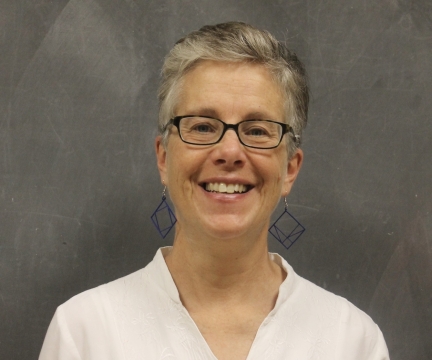Priscilla Bremser
Nathan Beman Professor Emerita of Mathematics

- Office
- Warner 203
- Tel
- (802) 443-5555
- bremser@middlebury.edu
- Office Hours
- Fall 2023: Monday 9:30 - 11:30, Tuesday 3:00 - 4:00, and by appointment.
Courses Taught
MATH 0101
Mathematical Problem-Solving
Course Description
Mathematical Problem-Solving
This course is designed primarily for students concurrently enrolled in MATH 121 or MATH 122 who would benefit from structured support to reinforce their mathematical backgrounds, and these students will be given priority at registration. We will emphasize problem-solving rather than a collection of procedures, using problems selected to strengthen students’ conceptual understanding of the material and their strategic competence. In an inquiry-based setting, students will practice and improve their algebra and trigonometry skills, with an emphasis on effective exposition of mathematical arguments.(This is a half credit course.)(Approval required.) 1.5 hrs. disc.
Terms Taught
MATH 0200
Linear Algebra
Course Description
Linear Algebra
Matrices and systems of linear equations, the Euclidean space of three dimensions and other real vector spaces, independence and dimensions, scalar products and orthogonality, linear transformations and matrix representations, eigenvalues and similarity, determinants, the inverse of a matrix and Cramer's rule. (MATH 0121 or equivalent, or by placement) 3 hrs. lect./disc.
Terms Taught
Requirements
MATH 0302
Abstract Algebra I
Course Description
Abstract Algebra
Groups, subgroups, Lagrange's theorem, homomorphisms, normal subgroups and quotient groups, rings and ideals, integral domains and fields, the field of quotients of a domain, the ring of polynomials over a domain, Euclidean domains, principal ideal domains, unique factorization, factorization in a polynomial ring. (MATH 0200) 3 hrs. lect./disc.
Terms Taught
Requirements
MATH 0500
Advanced Study
Course Description
Advanced Study
Individual study for qualified students in more advanced topics in algebra, number theory, real or complex analysis, topology. Particularly suited for those who enter with advanced standing. (Approval required) 3 hrs. lect./disc.
Terms Taught
MATH 0703
Finite Fields Seminar
Course Description
Finite Fields Seminar
This course is a tutorial in the theory and applications of finite fields, which lie in the intersection of algebra and number theory. Working in small groups, students will study the fundamental structure and properties of finite fields (also known as Galois fields). They will then work independently, exploring applications in cryptography, coding theory, or other areas. Students will gain experience reading advanced sources and communicating their insights in expository writing and oral presentations. This course fulfills the capstone senior work requirement for the mathematics major. (MATH 0241 or MATH 0302; Approval required) 3 hrs. Sem
Terms Taught
Areas of Interest
Research in Number Theory, Finite Fields, and Mathematics Education.
Academic Degrees
Degrees, Specializations & Interests:
A.B., Smith College; M.A., Ph.D., Johns Hopkins University.
